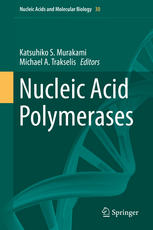

Most ebook files are in PDF format, so you can easily read them using various software such as Foxit Reader or directly on the Google Chrome browser.
Some ebook files are released by publishers in other formats such as .awz, .mobi, .epub, .fb2, etc. You may need to install specific software to read these formats on mobile/PC, such as Calibre.
Please read the tutorial at this link: https://ebookbell.com/faq
We offer FREE conversion to the popular formats you request; however, this may take some time. Therefore, right after payment, please email us, and we will try to provide the service as quickly as possible.
For some exceptional file formats or broken links (if any), please refrain from opening any disputes. Instead, email us first, and we will try to assist within a maximum of 6 hours.
EbookBell Team

4.1
70 reviewsThis book provides a review of the multitude of nucleic acid polymerases, including DNA and RNA polymerases from Archea, Bacteria and Eukaryota, mitochondrial and viral polymerases, and other specialized polymerases such as telomerase, template-independent terminal nucleotidyl transferase and RNA self-replication ribozyme. Although many books cover several different types of polymerases, no book so far has attempted to catalog all nucleic acid polymerases. The goal of this book is to be the top reference work for postgraduate students, postdocs, and principle investigators who study polymerases of all varieties. In other words, this book is for polymerase fans by polymerase fans.
Nucleic acid polymerases play a fundamental role in genome replication, maintenance, gene expression and regulation. Throughout evolution these enzymes have been pivotal in transforming life towards RNA self-replicating systems as well as into more stable DNA genomes. These enzymes are generally extremely efficient and accurate in RNA transcription and DNA replication and share common kinetic and structural features. How catalysis can be so amazingly fast without loss of specificity is a question that has intrigued researchers for over 60 years. Certain specialized polymerases that play a critical role in cellular metabolism are used for diverse biotechnological applications and are therefore an essential tool for research.